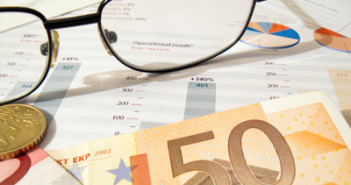The EUR/USD, which had an impressive rally just last week, continues to lose ground, after the release of disappointing data this morning. Manufacturing and Service PMIs out of Germany and the Euro-zone were weak, and the German Ifo Business Climate failed to reach the market estimate. ECB President Mario Draghi is scheduled to hold meetings and a press conference at the Bundestag in Berlin, but the markets will be focused on the US, where the Fed will set its benchmark interest rate and release its first monetary policy statement since QE3. Today’s key release is US New Home Sales.
Here’s an update about technical lines, fundamental indicators and sentiment regarding EUR/USD.
EUR/USD Technical
- Asian session: Euro/dollar was quiet, and consolidated around 1.2990. The pair has lost ground in the European session.
- Current range: 1.29 to 1.2960.
Further levels in both directions:Â Â 
- Below: 1.29, 1.2814, 1.2750, 1.2670, 1.2624 and 1.2587.
- Above: 1.2960, 1.30, 1.3060, 1.3105, 1.3170, 1.3290, 1.34, 1.3437 and 1.3480.
- 1.2960 is providing weak resistance. 1.30 is stronger.
- 1.29 is the next line on the downside.
Euro/dollar weakens after poor PMIs– click on the graph to enlarge.
EUR/USD Fundamentals
- 7:00 French Flash Manufacturing PMI. Exp. 43.9 points. Actual 43.5 points.
- 7:00 French Flash Services PMI. Exp. 45.6 points. Actual 46.2 points.
- 7:30Â German Flash Manufacturing PMI. Exp. 48.1 points. Actual 45.7 points.
- 7:30 German Flash Services PMI. Exp. 50.1 points. Actual 49.3 points.
- 8:00 Geman Ifo Business Climate. Exp. 101.5 points. Actual 100.0 points.
- 8:00 Euro-zone Flash Manufacturing PMI. Exp. 46.6 points. Actual 45.3 points.
- 8:00 Euro-zone Flash Services PMI. Exp. 46.5 points. Actual 46.2 points.
- Tentative: German 10-year Bond Auction.
- 11:45 ECB President Mario Draghi Speaks.
- 13:00 US Flash Manufacturing PMI. Exp. 51.6 points.
- 14:00 ECB President Mario Draghi Speaks.
- 14:00 US New Home Sales. Exp. 386K.
- 14:30 US Crude Oil Inventories. Exp. 2.0M.
- 18:15 US FOMC Statement.
- 18:15 US Federal Funds Rate. Exp. <0.25%
EUR/USD Sentiment
- Weak German, Euro PMIs: The markets were greeted with disappointing PMI numbers from Germany and the Euro-zone, indicating weakness in the manufacturing and services sectors. Adding to the bad news, the German Ifo Business Climate dropped to its lowest level since March 2010. The weak German numbers are likely to exacerbate market jitters over the health of the German economy, and the German government will find it very difficult to be generous when it comes to Greece and Spain.
- Spanish regions suffer downgrade: The Moody’s credit rating agency, which surprised the markets last week when it maintained Spain’s rating, brought down the gauntlet on Catalonia and four other regions – Andalucia, Castilla-La Mancha, Catalunya and Murcia. Moody’s cited poor liquidity and the huge debt problems that these regions are facing. The downgrade is another headache for the Spanish central government, and is sure to weigh on the euro.
- Election victory bolsters PM Rajoy: Spanish Prime Minister Mariano Rajoy received some much-needed good news on the weekend as his Popular Party won an absolute majority in the northeastern region of Galicia. In the Basque region, the PNV and Bildu, both staunch nationalist parties, were the winners. Madrid will no doubt spin the electoral victory in Galicia as a vote of confidence for the Spanish government’s austerity program. More importantly, the Spanish government may now feel that it can afford to delay a request for a relief package, and the saga over the Spanish bailout is likely to continue.
- New European “super bank†commissioner?: At last week’s EU Summit, Greece and Spain were barely mentioned. The leaders who attended focused on plans to move forward with the creation of a single European banking supervisory authority. However, the plan, which would represent an important step in European financial integration, is vague on key details, such as when the “super bank†commissioner will begin his/her work. Under the initiative, the Euro bank commissioner would be responsible for all 6,000 banks in the Euro-zone. ECB policymaker Joerg Asmussen has come out in favor of the idea, while German Finance Minister Wolfgang Schaeuble went a step further, stating that the EU needs a commissioner with power over member nations’ budgets.
- Greek/Troika talks continue: Talks continue between Greece and the European Union, European Central Bank and International Monetary Fund on a new set of spending cuts and economic reforms in exchange for the next installment of bailout funds, worth 31.5 billion euros. The talks have dragged on for months, and Greece claims it will run out of funds in November if it doesn’t receive the funds. According to a German media report, the German finance ministry was studying a proposal whereby the Greek government could borrow money from the ESM bailout fund and buy back its own bonds for 25% of their value, so that every euro would reduce the debt mountain by 4 euros. The German Finance Ministry refused to comment, sticking to the government’s official policy that no decisions will be made until the troika’s report is completed.
- Mixed data out of US continues: Recent data out of the US has been a mixed bag, as the economy seems to take two steps forward and one back. The Unemployment Rate unexpectedly dropped to 7.8%, but Unemployment Claims were much higher than the estimate. There are signs of an improving economy – housing numbers and consumer confidence, for example are pointing up. On the flip side, gas prices have spiked, government debt is at record levels, and the road to recovery promises to be a long one. With a tight presidential election only two weeks away, every US release will be under the microscope as Republicans and Democrats fight hard to use any economic data to their advantage.



